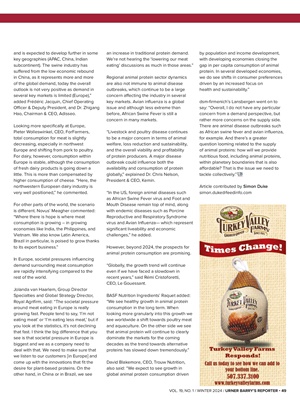
VOL. 19, NO. 1 / WINTER 2024 / URNER BARRY'S REPORTER • 49
and is expected to develop further in some
key geographies (APAC, China, Indian
subcontinent). The swine industry has
suffered from the low economic rebound
in China, as it represents more and more
of the global demand, today the overall
outlook is not very positive as demand in
several key markets is limited (Europe),"
added Frédéric Jacquin, Chief Operating
Officer & Deputy President, and Dr. Zhigang
Hao, Chairman & CEO, Adisseo.
Looking more specifically at Europe,
Pieter Wolleswinkel, CEO, ForFarmers,
total consumption for meat is slightly
decreasing, especially in northwest
Europe and shifting from pork to poultry.
For dairy, however, consumption within
Europe is stable, although the consumption
of fresh dairy products is going down a
little. This is more than compensated by
higher consumption of cheese. "Here, the
northwestern European dairy industry is
very well positioned," he commented.
For other parts of the world, the scenario
is different. Novus' Meagher commented:
"Where there is hope is where meat
consumption is growing - in growing
economies like India, the Philippines, and
Vietnam. We also know Latin America,
Brazil in particular, is poised to grow thanks
to its export business."
In Europe, societal pressures influencing
demand surrounding meat consumption
are rapidly intensifying compared to the
rest of the world.
Jolanda van Haarlem, Group Director
Specialties and Global Strategy Director,
Royal Agrifirm, said: "The societal pressure
around meat eating in Europe is really
growing fast. People tend to say, 'I'm not
eating meat' or 'I'm eating less meat,' but if
you look at the statistics, it's not declining
that fast. I think the big difference that you
see is that societal pressure in Europe is
biggest and we as a company need to
deal with that. We need to make sure that
we listen to our customers [in Europe] and
come up with the innovations that fit the
desire for plant-based proteins. On the
other hand, in China or in Brazil, we see
an increase in traditional protein demand.
We're not hearing the 'lowering our meat
eating' discussions as much in those areas."
Regional animal protein sector dynamics
are also not immune to animal disease
outbreaks, which continue to be a large
concern affecting the industry in several
key markets. Avian influenza is a global
issue and although less extreme than
before, African Swine Fever is still a
concern in many markets.
"Livestock and poultry disease continues
to be a major concern in terms of animal
welfare, loss reduction and sustainability,
and the overall viability and profitability
of protein producers. A major disease
outbreak could influence both the
availability and consumption of protein
globally," explained Dr. Chris Nelson,
President & CEO, Kemin.
"In the US, foreign animal diseases such
as African Swine Fever virus and Foot and
Mouth Disease remain top of mind, along
with endemic diseases such as Porcine
Reproductive and Respiratory Syndrome
virus and Avian Influenza- which represent
significant liveability and economic
challenges," he added.
However, beyond 2024, the prospects for
animal protein consumption are promising.
"Globally, the growth trend will continue
even if we have faced a slowdown in
recent years," said Rémi Cristoforetti,
CEO, Le Gouessant.
BASF Nutrition Ingredients' Raquet added:
"We see healthy growth in animal protein
consumption in the long term. When
looking more granularly into this growth we
see worldwide a shift towards poultry meat
and aquaculture. On the other side we see
that animal protein will continue to clearly
dominate the markets for the coming
decades as the trend towards alternative
proteins has slowed down tremendously."
David Blakemore, CEO, Trouw Nutrition,
also said: "We expect to see growth in
global animal protein consumption driven
by population and income development,
with developing economies closing the
gap in per capita consumption of animal
protein. In several developed economies,
we do see shifts in consumer preferences
driven by an increased focus on
health and sustainability."
dsm-firmenich's Lansbergen went on to
say: "Overall, I do not have any particular
concern from a demand perspective, but
rather more concerns on the supply side.
There are animal disease outbreaks such
as African swine fever and avian influenza,
for example. And there's a greater
question looming related to the supply
of animal proteins: how will we provide
nutritious food, including animal proteins,
within planetary boundaries that is also
affordable? That is the issue we need to
tackle collectively."
Article contributed by Simon Duke
simon.duke@feedinfo.com